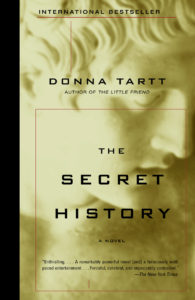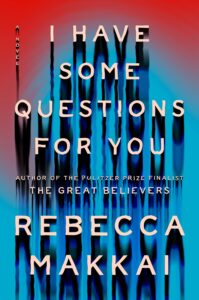To step into a campus novel, like stepping onto a college campus, is to enter a miniature world. It’s a place with a particular geography, made of dorm rooms and classrooms, student centers and dining halls. Time is both fixed and in motion: for students, it’s always moving toward an endpoint, while for professors, time passes, but their students remain young.
As a setting for fiction, the campus offers a natural structure and urgency: the arc of the semester, seasons of the academic year. Its insularity can make things seem outsized, dramatic, whether the arcane traditions or the eccentricities of roommates or the absurd inner workings of academia itself.
Lately, though, the college campus no longer exists in such a bubble. The anxieties of the real world—politics, social media, the climate crisis, uncertainty about the future—are pressing in. These concerns weigh heavily on the minds of the thoughtful undergraduates in my classes, and were on my own mind while working on Reunion, a novel about three old friends who return to their college campus many years later. The eight novels here include campuses past and present, six colleges and two boarding schools, classics in the genre and recent additions that interrogate the modern college experience or reflect on the past with a knowing eye.

Kiley Reid, Come and Get It
In the opening scene, Agatha Paul, visiting professor at the University of Arkansas, interviews three students about weddings. The conversation quickly unfolds in other directions, yielding admissions about race and class that are casually startling. Agatha’s research deepens—aided by diligent, hardworking RA Millie, who shares a wall with three clashing roommates—and the result is an unputdownable story as well as an incisive, addictive chronicle of consumer culture and what is taken, bought, and given away.

Daisy Alpert Florin, My Last Innocent Year
It’s the late nineties, the era of the Clinton-Lewinsky scandal, and Isabel Rosen’s senior year at Wilder College. A student from a working-class family, Isabel has always felt like something of an outsider on her rarefied New England campus. In her final semester, after a sexual assault by a classmate, Isabel is drawn into a consuming, complicated affair with a professor. My Last Innocent Year is not only a beautiful, spot-on depiction of being a young woman in college during a specific moment, but a wise exploration of how such a moment can shape a life.

Antonia Angress, Sirens & Muses
At the prestigious Wrynn College of Art, four lives are dramatically entwined: scholarship student Louisa, her seductive roommate Karina, visiting professor Robert Berger, and classmate Preston Utley, an Internet agitator. The first half of the novel delves into passions and rivalries in the bubble of art school, then cleverly pivots to life after graduation, the fallout from the 2011 recession and the pressures and anxieties of the art world in New York. It’s a mesmerizing story about art, class, sexuality, ambition—and the writing is exquisite.

Sara Novic, True Biz
At the River Valley School for the Deaf, new student Charlie is struggling to acclimate to life on campus; unlike most of her classmates, she’s never learned ASL. Headmistress February, a CODA (child of deaf adults), is navigating stresses in her marriage and uncertainties about the school’s future. Austin, a model student, is thrown when his sister is born hearing. The immersive True Biz—“real-talk” in ASL—doesn’t feel like it was written to instruct the reader about the Deaf community, but leaves you feeling enlightened just the same.

Sonora Jha. The Laughter
It’s uncomfortable to occupy the perspective of Oliver Harding—a tenured white male professor who fetishizes his new colleague, Pakistani law professor Ruhaba Khan—but that’s the point. Harding is puzzled by the changes on the campus (including the call for greater diversity) and in the world, where tensions are rising around the 2016 election and #MeToo. His fixation with Rubaba deepens when her teenage nephew, Adil, arrives to live with her. This shrewd look at modern academia (and modern America) is also a tense page-turner. And the ending is haunting.

Julie Schumacher, Dear Committee Members
This blistering academic satire is composed as a series of letters by Jason Fitger, a writing and literature professor at a meh Midwestern college, contending with drastic budget cuts to the English department and his once-promising writing career. He’s routinely called upon to compose letters for students, colleagues, committees—the very relentlessness of these letters a jab at academic culture—to say nothing of their content, which is scathingly funny and wincingly true. (Schumacher’s sequels, The Shakespeare Experiment and The English Experience, are hilarious/painful too.)

Donna Tartt, A Secret History
Is any list of campus novels complete without Donna Tartt’s iconic A Secret History? This Gothic mystery, set at an elite Vermont college, occupies a singular place in the canon of dark academia. From the prologue, we learn that Richard, while in college, was involved in a murder. His recounting of what happened—beginning with his fixation on a group of fellow students cultishly devoted to their Classics professor—is both a queasy thriller and a chilling exploration of privilege and class.

Julia Jonas, Vladimir
In this twisty, juicy, darkly funny take on Lolita, the unnamed narrator is a 50-something English professor/writer at a liberal arts college in upstate New York. Her husband (also an English professor/writer) is facing allegations over past relationships with students. Though they happened years ago (and his wife was aware) campus life has changed; students are angry and empowered. On-campus tensions and marital resentments shift into higher gear when a new professor, young experimental novelist Vladimir Valinski, and his wife, a troubled memoirist, arrive in town.

Rebecca Makkai, I Have Some Questions for You
The past is not a place that film professor Bodie Kane is keen to revisit, until she accepts a teaching invitation at her alma mater, a New Hampshire boarding school. Back at Granby, teaching a course on podcasting, she confronts not only conflicting versions of her teenage self but the mysterious circumstances around the murder of her roommate, Thalia Keith. This campus novel is both an entertaining whodunit and a no-pulled-punches reckoning with the past.
***





















